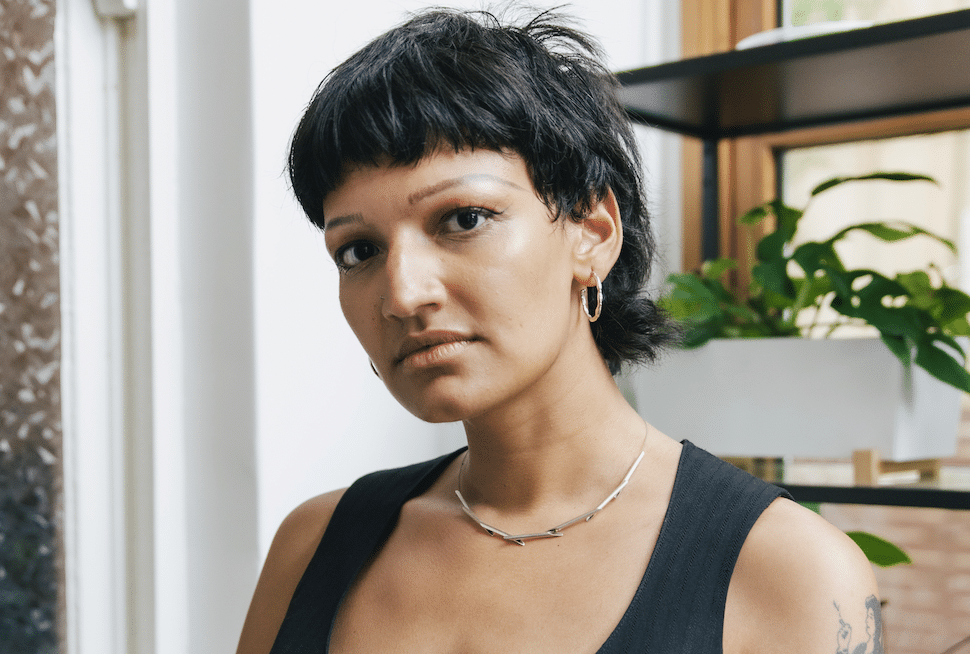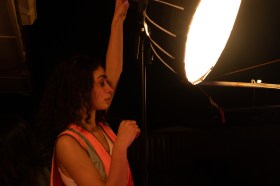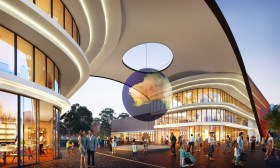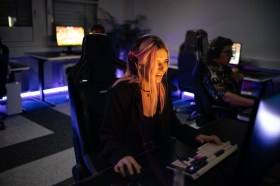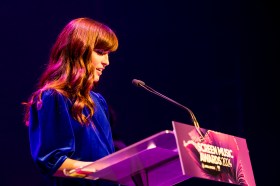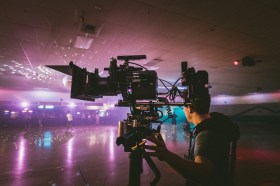Not every student knows exactly where they’re headed when they enrol in a course, yet so often we underplay the role of serendipity and discovery in education – the way a degree works as a process of honing skills and interests until a focus emerges. This was the case for Sydney-based screen producer Faraz Anarwala. Initially studying communications and literary studies at another university, she applied to the Australian Film Television and Radio School (AFTRS) almost on a whim.
After surviving study during COVID-19, Anarwala graduated from AFTRS in 2022 with a passion for authentic screen storytelling that ‘highlights social issues, and stories that bring awareness to topics that have been gate-kept through history’.
We talk to Anarwala about the experience of studying at AFTRS, the electives she chose in third year, the mentors and role models who’ve helped along the way, and what it was like to be part of the AFTRS Graduate Program internship at global production powerhouse Fremantle Australia.
What was the name of the degree you completed and why did you choose this?
My degree was the Bachelor of Arts Screen: Production at AFTRS. It was a three-year course that covers all the basics and fundamentals of screen production.
Choosing this course was a spur of the moment decision, but I remember doing film as a minor at my old university where it felt like The Breakfast Club – people were not taking the class seriously and I had had enough. I looked up the best film school in Australia, and submitted a story piece that showcased my vulnerability in it.
Read: Bay of Fires on ABC review: excruciating attempts at comedy
For the first two years at AFTRS you cover all aspects of production from pre-production to post-production. For my last year I was able to choose three electives to specialise in. I chose Production Design, Cinematography and Sound.
How long have you wanted to study the Bachelor of Arts Screen: Production and what drew you to it?
For most of my life, I’ve had to make risky decisions to authentically live life for me. I wanted to study film as I knew how powerful a tool it was for sharing insights and evoking human emotions. I always knew I wanted to be in a creatively collaborative field, and I wanted to learn the full scope of content creation. I realised halfway through my degree that producing was something that I really loved, as it was rewarding to bring an idea into fruition. Everything fell into place, and my ethos also followed.
I chose those electives during my final year to learn more about the scope of what these specialities entail, and to make me a better producer creatively.
I’ve always seen myself as more of a creative producer, and producing was not only about being business-minded, but knowing the full scope of production from start to finish. I learned that by understanding how these departments operate, I can make better creative and financial decisions on projects. Looking back now, I can say these electives definitely gave me a holistic approach to producing, which I’ve applied in all my jobs post-graduation.
Read: How to find a mentor – and make the most of it when you do
Is it common to combine specialities like set design and cinematography?
Production designers and directors of photography (DOPs) work together, just as much as the director does with the actors. DOPs need to know how they want the set to be lit, and what angles to shoot. Production designers must know everything that is in that shot to make sure their craft is properly executed. This is especially important if you’re shooting something that has a specific look. The production designer and DOP must work well together and communicate their vision to make sure both their specialities are highlighted as much as possible.
Being able to see the collaborative and important relationship with production design and cinematography as a producer, I am now able to ensure that the relationship these key crew members have in pre-production and during production is valued and honed. I want to make sure there is no hierarchy between these roles (as there sometimes is) and make sure there are resources available to support both these departments, to ensure the artistic vision and look is executed on screen, and also to create a safe space behind the screen.
Read: Audrey Napanangka review: an enriching piece of Australian cinema
What was the best aspect of the course for you?
The network I’ve built and opportunities I’ve received, and the motivation I’ve been given to push hard to make something work. I [now] see myself as a strong leader and, before I started, I had a lot of issues with leading. I’m also super grateful for all the connections and friendships I’ve formed with people who are my present and future collaborators.
The energy of being in the same space with passionate people was also rewarding, where support was always there. During COVID-19, a lot of our cohort struggled, but we were constantly each other’s support system.
What advice would you give someone else looking to get into this course?
It’s always good to go in with an open mind, and not limit yourself to just film. It’s good to have goals that you constantly look back to, as time flies by once you’re in the sauce. It’s good to explore what areas of content you’d like to hone, but also work with your strengths to improve them. You want to graduate with a skill that can land you work, but also keep working on your passions. It is literally a choice of your own adventure. You make the course however you want it to be.
The most important thing to remember is that if you want something, go for it. Everyone is on their own creative journey, and comparison with others can be the hindrance to your own growth.
Did you do work outside of your studies?
Yes! When I first started my degree, I was working part-time at Apple, which was helpful. The customer service skills I was constantly applying at work helped me put myself more out there when I was studying. I was able to take more risks, reach out to people and have the confidence to make the course my own.
I also got my first job as a junior producer during my last year of studying; this helped me ease myself into the professional industry much quicker.
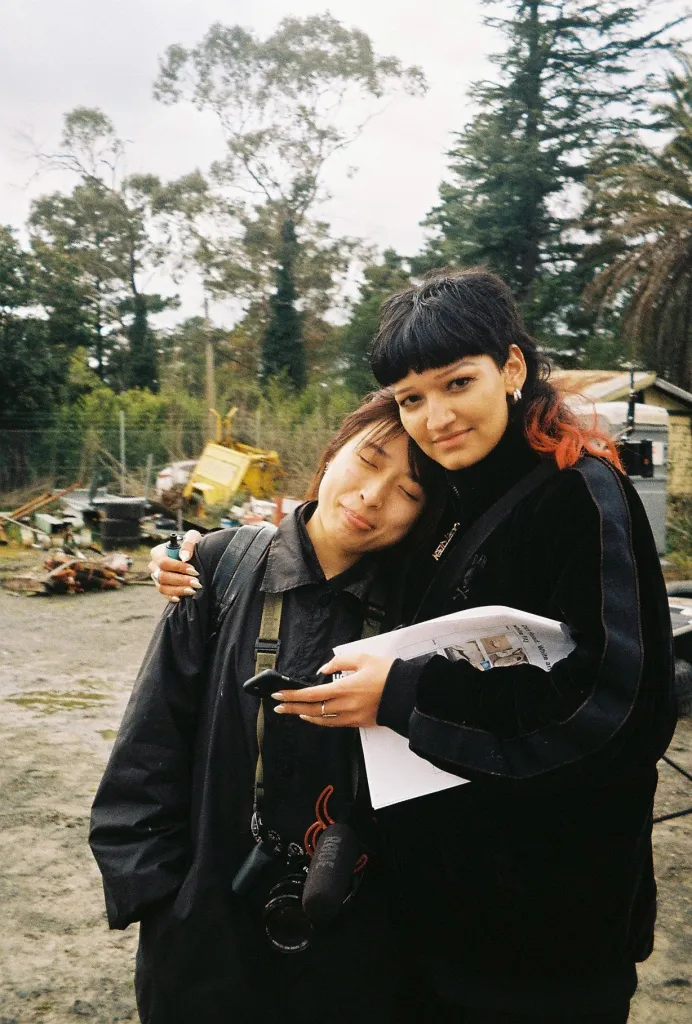
Has your specialisation ambition changed in any way since starting your course?
I’ve done a lot of contract work since I graduated and my filmmaking ethos has changed throughout the year. I don’t think my area of speciality has changed; it’s more how I go about it and the types of projects I want to work on. I’ve realised I want to work on grass roots projects and get more fulfilment in work that empowers the community. This has also helped me say “no” to things that don’t align with me, and find more like-minded people who value authenticity and community. I’ve met so many more women of colour in the industry who I have connected with and am excited to do more projects for.
For my most recent job I was assistant producer for Minori Ueda, an amazing creative producer from Cairns who moved to Sydney. She collaborated with communications agency Two Birds Talking and creatively directed a Foot Locker Tuned shoot. It was an amazing set to be on, as it was an almost all-female diverse crew, and our chemistry was off the charts. It made me realise that producing is about having so much love for a project that you will do everything to make sure it succeeds.
If you hadn’t studied at AFTRS what would you be doing instead?
Before I did my degree at AFTRS, I was doing a communications degree and loved literature studies. If my previous university hadn’t had that minor in film production, I might have written a thesis by now.
Can you give us one tip that you wish someone had told you?
That it is OK to question your path sometimes, and that you can make your own path after learning how others are doing it first. That is where I feel like I’m headed now, trailblazing a path that is suited for me and giving more people like me a chance.
Ideally, five years from now, what would you be doing?
I want to start my own production company, and constantly try to involve emerging filmmakers in the scene, so they can build their work up and give them that platform. I’ve realised how important collaborators are, and building up the network and giving everyone a chance is my core value.
Who are three artists/writers/filmmakers whose work inspires you?
Donald Glover for sure. I mean Atlanta is such an amazing series and a great example of how attention to detail and authenticity can be achieved in a specific lens. (It’s always amazing to see how much work and effort the extras in that show give to thrust us into that world.)
Daniel Kwan and Daniel Scheinert for Everything Everywhere all at Once. That movie was perfect in every way possible – cutting edge production values while also making us care about the characters. The ability to showcase technicality while also conveying a simple theme of love left me in awe.
Lastly, writer Gretel Vella. Having the privilege of being in a writers’ room with her and seeing her creative process has been so inspirational. Her ability to connect personal experiences and incorporate collaborative ideas in her writing process (Totally Completely Fine, The Great) while also writing female empowered scripts shows how gifted and talented she is.
What can you tell us about your internship at Fremantle Australia? How did it come about, and what did you work on?
The internship at Fremantle was an absolute godsend. It was part of the AFTRS Graduate Program in 2022 and was geared more towards development. Development is usually the seed, where ideas get honed and some get left out. It is the stage where it is all about why the idea needs to be made and how it would be best executed (format, genre, platform and distribution methods are also discussed).
This meant I was able to observe writers’ rooms, write coverage for existing IPs (intellectual properties) and dissect pitch decks. I applied for Fremantle and, during the interview, my interviewer (Ana Jimenez, Development Executive) was super open to me discussing my viewpoints on diversity and I felt a genuine connection with her. I knew this was the company I wanted to intern for.
I was rotating between different departments (Scripted, Non-Scripted/Podcast) and was able to work with different executives on their projects and shadow big production meetings. It helped me understand how an idea develops first and opened my eyes to a whole new stage of production.
Do you have a mentor?
I’ve had the honour to be mentored by Greer Simpkin of Bunya Productions and, before I started my internship, I was able to work at Bunya and see how they operated. Even though it was a few weeks, Greer gave me the safe space to learn and absorb as much information as I needed before I started my internship for Fremantle.
During my time at Bunya, Greer gave me the agency to help facilitate the Loveland screening tour with Ivan Sen and Hugo Weaving. I was able to oversee the distribution side of things and see the way Marketing and Distribution communicate with upcoming releases/guest talks. I also had the privilege of assembling the itinerary for Greer and David Jowsey (co-founder of Bunya and Greer Simpkin’s husband) when she was asked to be a part of the judging panel for Series Mania 2022 in Lille, France.
I was able to have first-hand experience and see how Greer’s values translate in her work. I’m so glad to be connected to someone who I look up to and reach out to when I need that extra support.
Someone else I look up to is Gabrielle Pearson of Majella. She started her own production company, honing in on the female gaze, and only takes in clients that respect her values. I’ve had the honour of speaking to her, and she is someone I admire.
Where else can we find you?
I’m on LinkedIn and Instagram and here are some examples of my work: I was Producer on Urban Murries, AFTRS Graduation Project (Proof of Concept); Production Assist, ABC Kids NYE Early Night Show 2022; Producer, Chanel Loren, ‘F4U’ music video; Assist, Triple One, ‘Peter Rabbit’ music video.
Upcoming projects include: Screen NSW Production Attachment for SBS and Lingo Erotic Stories; and Assistant Producer for Foot Locker, Two Birds Talking and Sonda TV for Nike Tuned shoot.

